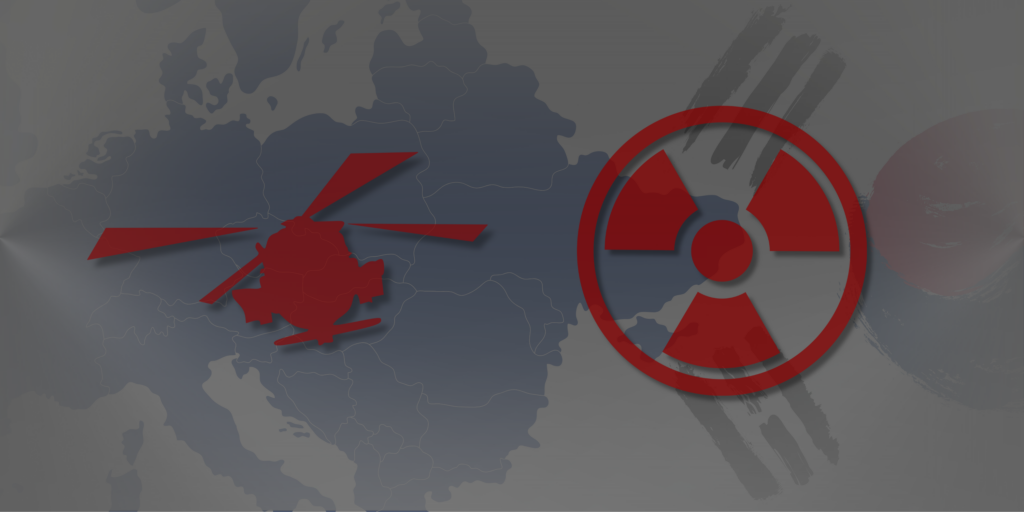The worsening security in Europe highlights the dangers of relying on high-risk states, pushing European countries to find new partners. Democratic East Asian nations, especially South Korea, are a promising option, as shown by the Czech government’s 2024 decision to award a major nuclear power plant contract to a South Korean company.
Key takeaways:
-
South Korea has increasingly become a significant economic and security partner for Central European countries, specifically through nuclear and defense contracts.
-
While South Korea has strengthened relations with V4 countries, most of the cooperation occurs on a bilateral basis rather than via a cohesive subregional strategy.
-
The V4 countries could serve as a strategic gateway for South Korea’s broader engagement with the EU due to their unique combination of economic, geographic, and political advantages.
The largest European conflict since World War II is unfolding on the EU’s eastern border. Western alliances in the Middle East are experiencing a turbulent phase. Citizens of the United States have elected Donald Trump as their next president, whose unconventional approach to international relations generates significant uncertainty. Meanwhile, China is emerging as an increasingly unreliable partner. As a result, the community of European states, both at the national and Union levels, recognizes the need to seek new security-economic partners within the framework of de-risking, or to renew and deepen old alliances.
One such longstanding partner of Europe, which is becoming increasingly attractive, is South Korea. This was recently demonstrated by the Czech government’s decision to select the South Korean company Korea Hydro & Nuclear Power Company (KHNP) to build two additional blocks of the Dukovany nuclear power plant, as well as by a series of defense contracts between South Korea and Poland. Warsaw has also established ties with KHNP, having signed a letter of intent two years ago to develop nuclear capacities, specifically at the Pątnów nuclear power plant.
In recent years, South Korea has increasingly been regarded as a security-strategic partner, particularly in Central Europe.
Historical proximity of strategic partners
The Republic of Korea represents an attractive strategic partner, ranking among the twenty most successful economies globally and holding fourth place in Asia. In terms of exports, South Korea is among the top ten largest exporters worldwide, with a monthly outward foreign investment balance of around USD 4 billion. Its dominant position in high-end electronics, the stability of its democratic political system, and the belief that the Republic of Korea has no threatening geopolitical ambitions also attract foreign partners. Conversely, South Korean leaders are drawn to the EU member states due to their direct access to the European single market, with the potential to set up production bases of Korean companies.
Relations between Central Europe and South Korea are not a recent development; they can be traced back to the late 19th century when the Joseon Empire established official ties with the Austro-Hungarian Empire. At that time, much like today, the Korean Empire faced the rise of a regional power – Japan – which was expanding its dominance over neighboring countries. Aware of its military and economic vulnerabilities, the Korean Empire sought to establish strategic partnerships worldwide, including with the United States, the United Kingdom, and France. Despite these efforts, Korea was eventually annexed by Japan, and relations between South Korea and Europe were subsequently disrupted by the two World Wars and later by the Cold War. Nevertheless, this historical context sheds light on South Korea’s current efforts to strengthen strategic ties with distant partners, rather than indicating a particular inclination toward Central Europe.
The current potential for a deeper relationship between South Korea and the medium-sized V4 countries could be better explained by another but related factor: mutually non-threatening geopolitical ambitions. South Korea, Poland, Czechia, Slovakia, and Hungary are not major geopolitical players; on the contrary, they may feel threatened by surrounding powers. Geopolitics also disrupted their mutual relations for a long time, but the Central European countries quickly restored them with the East Asian tiger shortly after 1989. Following a decade of limited relations, during which the V4 countries focused primarily on integrating into Euro-Atlantic strategic structures, the subsequent two decades of the 21st century have seen increasing trade and security cooperation with South Korea. This has been significantly supported by ideological proximity in their fundamental alignment with Western values.
South Korea and the V4 countries: a specific subregional interest?
Similar historical context and the status of the Visegrád Group countries suggest the potential for a more exceptional relationship between them and South Korea. However, the question remains whether Central Europe is uniquely attractive for Seoul. South Korea’s economic diplomacy towards Europe is characterized by a strategic combination of both bilateral and multilateral commitments, with particular emphasis on key EU member states and sectors of common interest. However, it tends to prioritize bilateral relations with individual EU countries where substantial economic benefits or strategic partnerships can be achieved. Nonetheless, available data suggests that South Korea does indeed focus more on certain Central European states than on others in their neighborhood.
Upon joining the EU in 2004, the Visegrád Group countries adopted all the rights and obligations of the EU’s Common Commercial Policy and have since developed their trade and economic cooperation with third countries, including the Republic of Korea. Another set of important milestones came in 2010 and 2011, when the EU first elevated its relations with the Republic of Korea to a strategic partnership and then concluded a Free Trade Agreement (FTA) with the Asian partner (in force since 2015).
FTA is particularly important for V4–South Korea relations, as it redefined bilateral relations and laid the foundation for stronger cooperation and trade in traditional sectors such as the automotive industry, advanced technologies, and electrical machinery by reducing existing tariffs and eliminating many non-tariff barriers. This framework for trade and economic cooperation was further supported by the elevation of individual political relations with South Korea to the level of strategic partnership, which was done by Poland (2013), the Czech Republic (2015), Hungary (2021), and Slovakia in September 2024 during Slovak Prime Minister Fico’s visit to the country.
The V4 countries are dynamic and competitive economies, collectively forming a market of over 60 million consumers, contributing nearly 8% to the EU’s GDP, which has been and remains an attractive business opportunity. Indeed, according to the European Commission website, “Korean investments are particularly focused on the electric vehicles sector, with Hungary, Poland, and Germany being the largest investment destinations in 2022.” Poland and Hungary account for approximately 9% and 6%, respectively, of South Korea’s total investment in Europe, with the Czech Republic and Slovakia also ranking in the top ten. Additionally, Slovakia and Hungary are the largest markets for South Korean goods in the EU, with Poland and the Czech Republic among the top ten. South Korea exports mainly manufactured goods to the EU, most of which are motor vehicles and their parts, electrical machinery and pharmaceutical products.
The trend of increasing strategic presence of South Korea in CEE countries is likely to continue, particularly as Warsaw’s defense contracts materialize. In the coming years, the Polish military is set to strengthen its capabilities with acquisitions such as South Korean FA-50 light combat aircraft, K2 Black Panther tanks, and K9 Thunder self-propelled howitzers. Moreover, Bratislava may follow the Czech example in seeking energy sector cooperation with Seoul, as illustrated by the memorandum of understanding on comprehensive energy cooperation signed during Prime Minister Fico’s visit to South Korea. South Korea’s KHNP has also expressed interest in Slovakia’s plans to construct a new reactor at the Jaslovské Bohunice nuclear power plant.
Conclusion: closer, but not equally
Has Seoul found a firm foothold in Central Europe, or is it strengthening strategic partnerships across Europe irrespective of subregional divisions? The relationship between the Visegrád Group countries and South Korea should not be overstated, nor should it be evaluated strictly from a subregional perspective. While in recent years V4 leaders have made efforts to establish closer subregional cooperation with South Korea (as evident from mutual summits and joint statements), collaboration in key sectors has primarily developed bilaterally on a state-to-state basis.
This does not change the fact that the V4 countries, with their membership in the EU, unique central location in Europe, well-qualified and still relatively affordable workforce, and belonging to the transatlantic community, constitute an attractive destination for South Korean investment. In some sectors (such as defense, energy, etc.), they also serve as a testing ground for potential broader EU-wide cooperation. Specific South Korean strategic investments thus could make the V4 countries a gateway to even closer ties between South Korea and the EU.
This work has received funding from the European Union’s Horizon Europe coordination and support action 101079069 — EUVIP — HORIZON-WIDERA-2021-ACCESS-03.
Funded by the European Union. Views and opinions expressed are however those of the author(s) only and do not necessarily reflect those of the European Union or the European Research Executive Agency (REA). Neither the European Union nor the granting authority can be held responsible for them.
Has South Korea found its firm foothold in Central Europe? by David Broul, Antonín Nenutil is licensed under CC BY 4.0.








